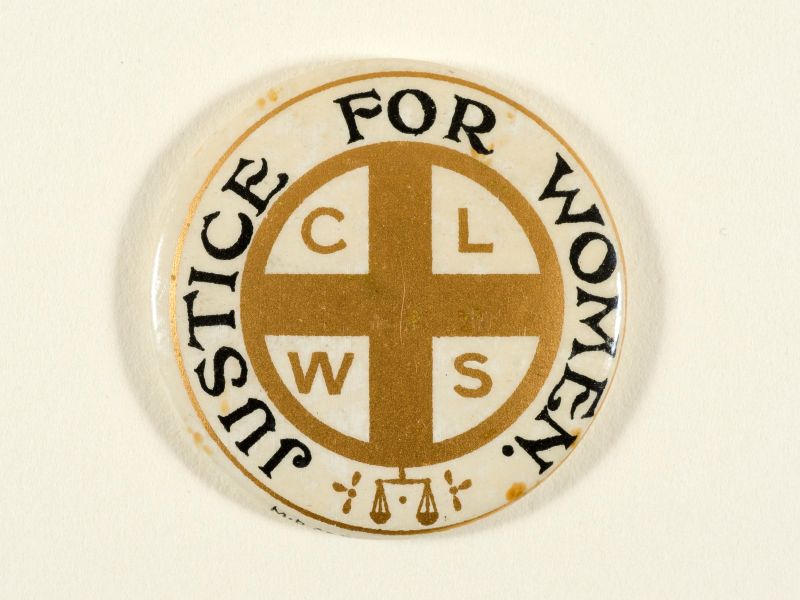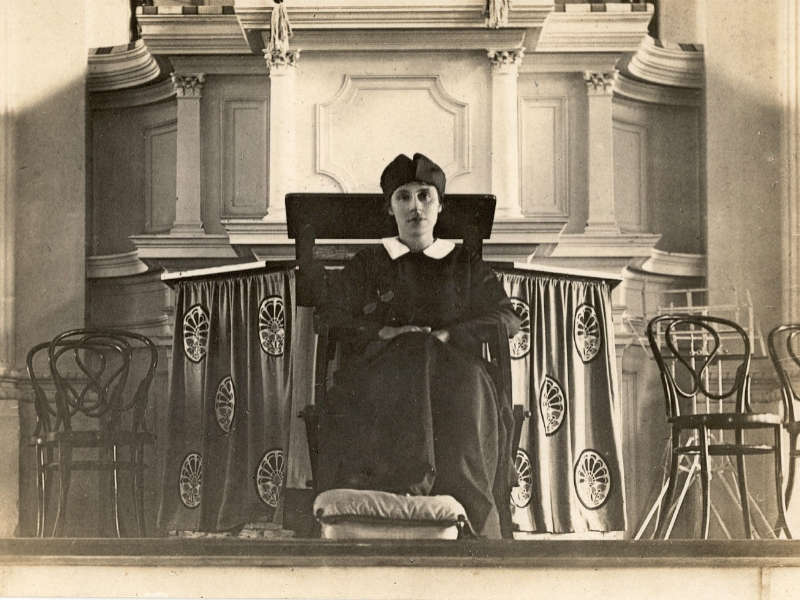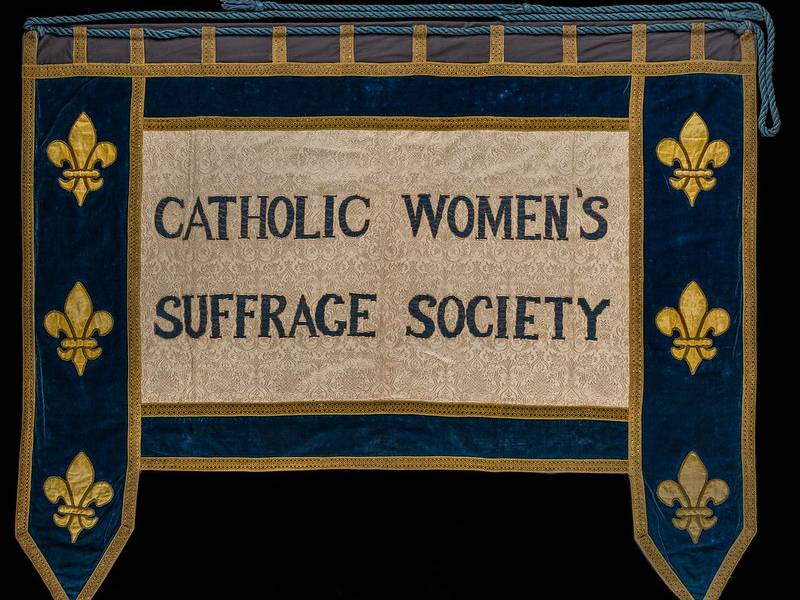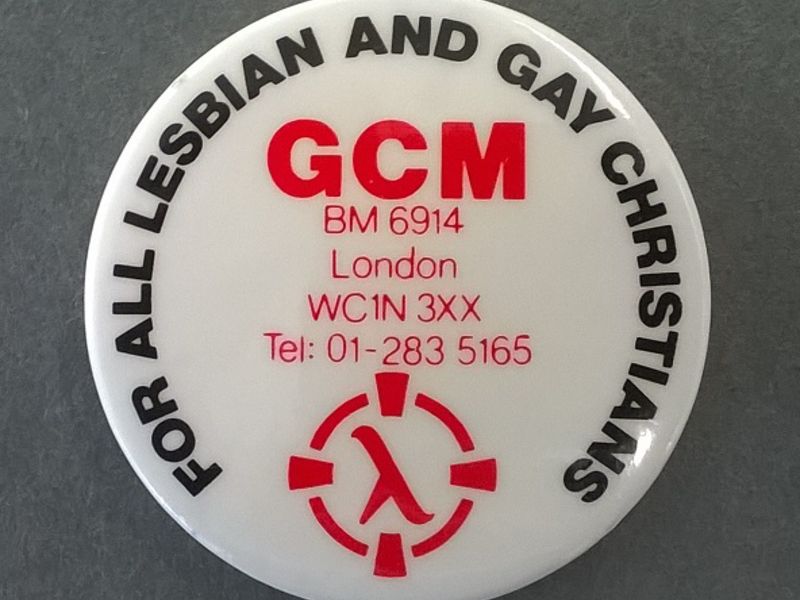Victorian sexual morality
Josephine Butler was a clergyman’s wife who campaigned against the double sexual moral standard of the Contagious Diseases Acts, both in Britain, through the Ladies National Association, and on the continent, through the International Abolitionist Federation, from 1869 until her death in 1906. She was a devout Christian whose spiritual experiences inspired her work, which can be seen in her letters.
Church feminism
During the early 20th century, some activists sought equal representation for women both in society and in the church. Agnes Maude Royden, Louise Creighton, Edith Picton-Turbeville and Ursula Roberts were prominent Anglican feminists. They were also suffragists, who were involved in the founding of the Church League for Women's Suffrage in 1909, and in the movement for Church reform.
 A Church League for Women's Suffrage badge.
A Church League for Women's Suffrage badge.
You can have a look at copies of the Church League for Women's Suffrage monthly newspaper on our digital library.
There were many religious suffrage societies including the Free Church League for Women's Suffrage, Friends' League for Women's Suffrage and the Jewish League for Woman's Suffrage. You can find out more about these organisations on our digital Women's Rights Collection.
We also hold papers of other Christian feminist activists: Amelia Scott and Alice Abadam.
 Agnes Maude Royden at the Guidhouse in 1922 (7AMR).
Agnes Maude Royden at the Guidhouse in 1922 (7AMR).
Agnes Maud Royden was an accomplished adult education lecturer and suffragist speaker who accepted a post to preach in the Congregational City Temple where she held a long-standing ministry.
The Church League for Women’s Suffrage was renamed the League of Church Militant after the granting of limited Parliamentary suffrage to women in 1918. It continued to campaign for equal franchise for women and for women to be ordained in the Church. The League disbanded with the passing of the Equal Franchise Act in 1928 and the campaign for women's ordination was taken up by the Anglican Group for the Ordination of Women. Ursula Roberts was a key member.
In 1930 Royden founded the interdenominational Society for the Equal Ministry of Women (later the Society for the Ministry of Women in the Church). This group continued until 2005.
 A Catholic Women's Suffrage Society banner.
A Catholic Women's Suffrage Society banner.
Catholic feminism emerged in the formation of the Catholic Women's Suffrage Society in 1911 which became the St Joan's Alliance, still active today, pursuing social justice for women.
The 1970s and 1980s: watershed in Christian women's consciousness and activity
The 1970s was a period of women's liberation and consciousness-raising. Landmark legislation was passed such as the Sex Discrimination Act 1975 but this did not apply to the Church. The 1970s saw the emergence of several new religious groups, each with their own newsletters. These include:
Lesbian identity in the Church
The Catholic Lesbian Sisterhood, founded by Maggie Redding in 1979, was an explicit lesbian presence within the Catholic Church. The group established links with the growing Christian feminist network.
Elaine Willis played a key role in raising lesbian visibility within the Christian women's movement and, in particular, the Gay Christian Movement. Sheila Briggs addressed the annual meeting of the Gay Christian Movement in 1984. This helped break the silence over lesbian sexuality and identity, which eventually led to the Gay Christian Movement changing its name to the Lesbian and Gay Christian Movement in 1986. This organisation is still active today known as One Body One Spirit.
 Lesbian and Gay Christian Movement badge.
Lesbian and Gay Christian Movement badge.
Christian women and the 1980s Peace Movement in Britain
Greenham Common Women's Peace Camp was a focal point in the 1980s Christian women's movement. Various newsletters from Greenham Common eg Women for Life on Earth, and Christian Feminist newsletters show this.
The group, Pax Christi, initiated a monthly peace vigil at Greenham Blue Gate in August 1984 and a tradition of Holy Week liturgies began in 1985 with organised participation by the Catholic Women’s Network and Women in Theology.
Christian CND, a special section of CND, has existed since 1960.
How to search
This is just a snapshot of material that we hold on this subject. You can find out more using:
- The archives catalogue using key words such as "Pax Christi", “Women in Theology”, “Catholic Lesbian Sisterhood”, "Christian feminist", "Anglican", "women's ordination", "priest" etc.
- Library Search for newsletters and pamphlets of organisations eg The Catholic Citizen.
How to access
Most of the material highlighted here is stored in closed access and must be consulted in The Women’s Library Reading Room. Find out how to book your place and order material on our access archives and special collections page.
Further information
If you need specific help with any of the collections mentioned here, get in touch with our Curator for Equality, Rights and Citizenship, Gillian Murphy.